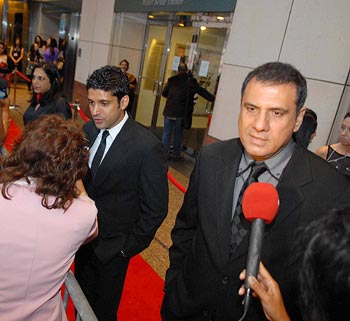 | « Back to article | Print this article |
John Abraham, Farhan Akhtar cheer NY festival
Mira Nair invoked a favourite mantra once again last week at I View Film, which is emerging as a significant film festival in New York. She asked, if we don't tell our own stories, who will?
She was complimenting filmmakers, including Zoya Akhtar whose Luck by Chance was one of the entries at the event. The film was chosen because it showed an aspiring actress (Konkona Sen Sharma) trying to hold her own ground in a male dominated film industry and who decides to empower herself in the face of the infidelity of her lover (Farhan Akhtar), who has suddenly become a movie star. It deals with gender inequity, the organisers of the festival said.
Nair's TV film My Own Country -- based on a bestseller by Abraham Verghese and dealing with an Indian doctor's interactions with AIDS-stricken patients in a Tennessee town in 1985 -- was also featured at the three-day event which ended on Sunday.
She does not set out to make political films, Nair said, but she has always been drawn to the subjects about marginalised people, be it the street children in Salaam Bombay! or immigrant parents (The Namesake). Whatever the subject be, she asserted, she made sure the film came from her heart. Some people have called her films 'populist,' and it was alright with her, as she wanted her work to reach people of various temperaments.
Nair will readily confess that she has little time on her hands these days as she is preparing her much awaited biopic Amelia for a late October release.
John Abraham, Farhan Akhtar cheer NY festival
The festival drew half a dozen filmmakers, writers and actors from Mumbai: (writer-director of Dostana) Tarun Mansukhani, John Abraham, Boman Irani, Farhan Akhtar and sister Zoya.
John Abraham, Farhan Akhtar cheer NY festival
Filmmakers came from around the world. A Norwegian director brought a documentary made in Sri Lanka; New York based Pakistani film-maker Meheer Jabbar showed two short films set in her country, and 18-year-old Devika Urvashi Bhise unveiled her 18-minute long film on hijras.
The festival included recent and a little seen but much acclaimed film Let's Talk by Ram Madhvani that dealt with a woman's affair and her husband's reaction.
John Abraham, Farhan Akhtar cheer NY festival
There were also shorts and documentaries, including one focusing on Tamil female suicide bombers in Sri Lanka (My Daughter The Terrorist).
Pervez Sharma's documentary Jihad for Love, which looks at the hidden and apparent gay and lesbian lives in the Muslim world, was also screened. The film has been shown in more than a dozen important film festivals including the one in Toronto in the last two years. It continues to engage Muslim activists across the world.
Pervez Sharma saw the festival as a venue for filmmakers, media and audiences to discuss the issues affecting gays, lesbians and women. The festival 'enables an honest and unprecedented exchange of views between filmmakers and media makers who would not engage in a conversation on gender and sexuality with each other and that itself is a reason to celebrate.'
John Abraham, Farhan Akhtar cheer NY festival
The festival was organised by Engendered, started by Myna Mukherjee. A former Wall Street executive, she left the financial world to start a feminist dance theatre several years ago. She then started Engendered, a non-profit organisation that produces a yearlong cultural and political festival of South Asian-themed performances and art exhibitions highlighting the issues of sexuality in the context of human rights.
"We want to highlight the work in which men and women do not accept handouts or kind attitude towards their choice of lifestyle," she said. "They demand their rights. Their fight has to be called a fight for human rights."
Mukherjee said Dostana was chosen to open the film festival because it was a mainstream film in which two men (Abhishek Bachchan and John Abraham) pretended to be gay.
"The film leads to important conversations about the portrayal of gay men," she said.
John Abraham, Farhan Akhtar cheer NY festival
'A lot of what people [in South Asian culture] see as acceptable or non-acceptable is dictated by the film industry,' she told Time Out magazine, adding Dostana marked the first time that straight mainstream actors played gay. 'It showed onscreen kissing-with two males! It was a very big deal. It normalises the issue. There are a lot of stereotypes in the film, but everyone's talking about it.'
Director Mansukhani said while he had made a masala film, he had also taken care to portray gay men with respect. And yet the film was also designed not to shock or shake the more conservative audiences. In an interview he said a gay man told him that soon after seeing the film he told his 14-year-old sister in Mumbai that he was gay. And the sister asked him if he was 'John Abraham gay or Abhishek gay.'
For Mukherjee, the festival and the support it has received from big names such as Mira Nair showed that I View Film festival will carry on with its mission more vigorously in the future.
"The festival will continue to engage, uplift and transform the viewer perceptions and social mores about women's issues, minority, civil and health rights and the LGBT community," she added.





